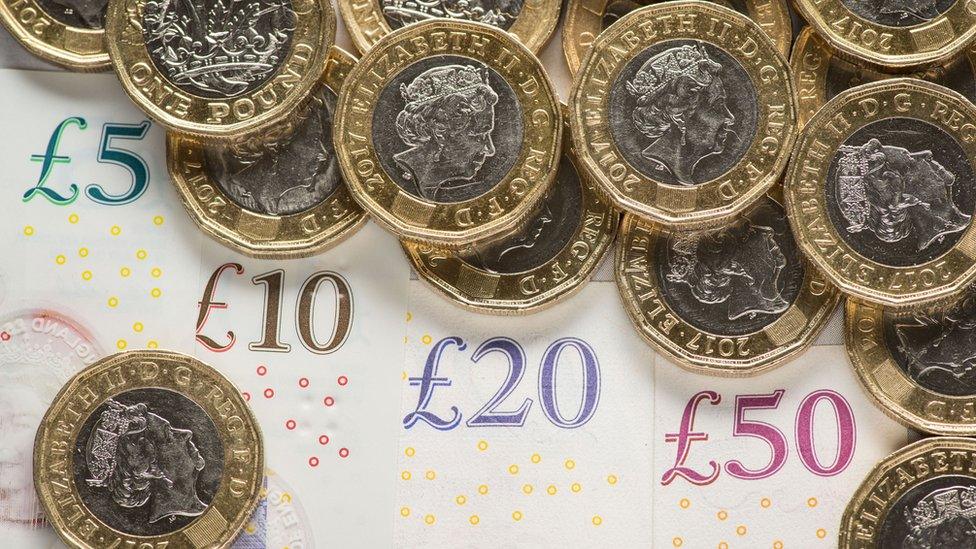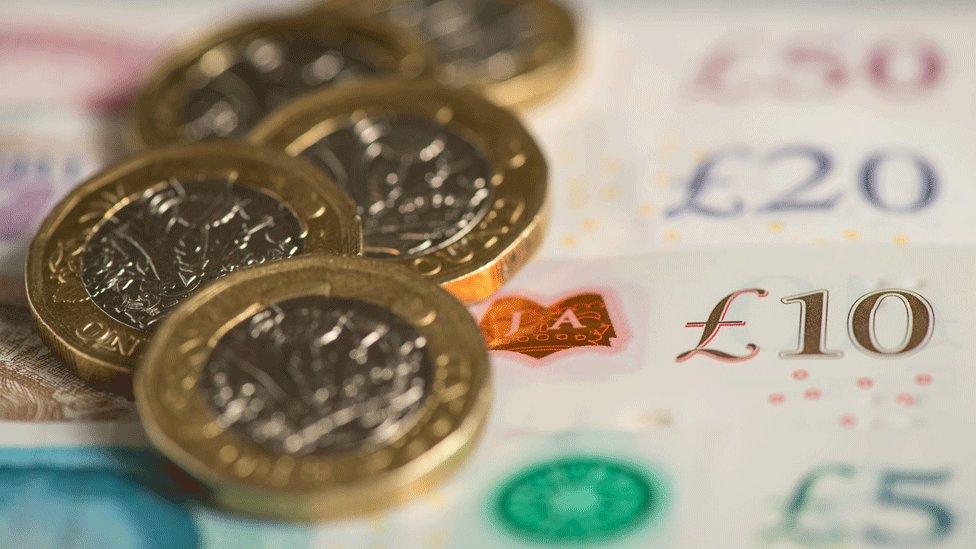Scotland public funding '30% higher' than England
- Published

The Scottish government's funding per person is almost 30% higher than the English equivalent, a leading economic research group has said.
The Institute for Fiscal Studies (IFS) said this was mostly due to the Barnett Formula.
It also found the Scottish government had used temporary coronavirus funding to pay for some permanent policies.
But excluding pandemic funding, the IFS said Scotland has 2% less spending per person in 2021-22 compared to 2010-11.
The findings were published in the IFS's first briefing note ahead of the Holyrood election, focusing on how funding has changed in recent years.
A large chunk of the Scottish budget comes from the block grant - a share of the UK-wide budget as calculated via the Barnett Formula - but tax revenues raised in Scotland have played an increasingly large role in recent years.
Scottish income tax will contribute 27% and other Scottish taxes 5.5%, with borrowing contributing the remaining 0.5%.
Covid funding
In its briefing note, the IFS said the Scottish government had received an additional £9.5bn from the UK government in Covid-related funding.
Combined with a special funding guarantee, it said per capita coronavirus funding was likely to be higher in Scotland than in England for the next fiscal year.
The Scottish government now has over £1.30 per person to spend on public services for every £1 of comparable spending per person in England, according to the findings.
The IFS said not all of the extra funding was going to Covid-related spending, with some being used to extend free school meals and free bus travel.
It warned these would have to be funded from the core budget in 2022/23 and beyond, when money is likely to be "tight".

SCOTLAND'S ELECTION: THE BASICS
What elections are happening? On 6 May, people across Scotland will vote to elect 129 Members of the Scottish Parliament (MSPs). The party that wins the most seats will form the Scottish government. Find out more here.
What powers does the Scottish Parliament have? MSPs pass laws on most aspects of day-to-day life in Scotland, such as health, education and transport. They also have control over some taxes and welfare benefits. Defence, foreign policy and immigration are decided by the UK Parliament.
How do I vote? Anyone who lives in Scotland and is registered to vote is eligible, so long as they are aged 16 or over on the day of the election. You can register to vote online, external.

The IFS also found that the Scottish government's devolved taxes were contributing a modest but growing sum to its funding.
Plans suggest core funding will be about 3% higher in 2021-22 than in 2010, but population growth means this is around 2% lower per person.
Financial pressures
David Phillips, associate director at the IFS and author of the report said the "relatively weak performance" of the Scottish economy meant the net revenues from income tax have only increased "slightly", despite tax increases in Scotland.
He said: "They would have fallen relative to a world without tax devolution had those tax rises not been implemented, reminding us that devolution brings risks as well as opportunities.
"Likely tight spending plans in Westminster could mean the next Holyrood administration will have to consider tax increases or cuts to some services - not least to pay for long-term policies on free school meals, public transport, council tax and mental health services, that this year will be paid for using temporary Covid-19 funding."
What's the political reaction?
The SNP's Kate Forbes, the Scottish government's finance secretary, said the Barnett Formula was "under attack" by the Westminster government, accusing ministers of "pork-barrel spending" through the levelling up fund, external.
She said: "An independent Scotland would be able to make different choices, and give us all the economic levers needed to grow our economy and to make the public spending choices best suited to Scotland's interests - such as not spending hundreds of billions of pounds on the Trident missile programme."
Scottish Greens co-leader Lorna Slater said that Scotland's five-band income tax system should be "more progressive" going forward to "close the income gap" - but added Scotland has "vast potential resources, especially in renewable energy".
Scottish Lib Dems economy spokesperson Katy Gordon said: "At some stage the nationalists are going to have to admit that if they ever achieved independence they would be throwing away billions of pounds a year for public services."
Scottish Labour finance spokesperson Daniel Johnson said: "If temporary Covid funds are in fact being used for permanent spending commitments, what excuse does the SNP have for Scotland's heroic social care workers being denied fair pay, and what do they say to those individuals and businesses who have had no or inadequate Covid support?"
Scottish Conservative economy spokesperson Maurice Golden said the analysis "makes it clear" that Scotland remaining part of the union will be "essential" for economic recovery, as the money received through the Barnett formula "will be key to saving jobs, supporting businesses, growing the economy and offering high-quality workforce training".

POLICIES: Who should I vote for?
PODLITICAL: Updates from the campaign

- Published7 December 2021
